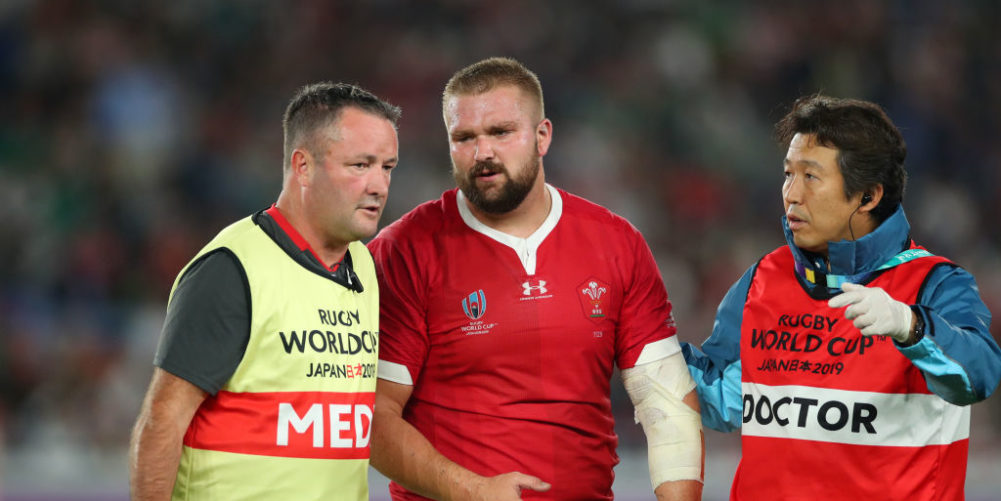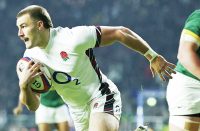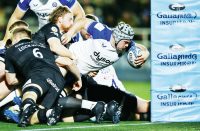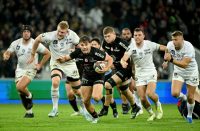Tomas Francis went to the World Cup ahead of schedule for his 50th Test in record time, a prop leaving the speed merchants in his slipstream.
In a perfect world, he would have reached the landmark in the final and along the way found a less hazardous way of stopping Duane Vermeulen, a very large South African who came careering towards him in Yokohama like a ten-ton truck at full throttle.
Five months later, the unflinching Welsh tighthead is still recovering from a valiant attempt to tackle the Springbok No.8 during the first half of a grim semi-final in Yokohama. The collision caused serious damage to Francis’ left shoulder.
The labrum, the part which reinforces the ball and socket, hadn’t merely been torn but torn to a grotesque angle of 270 degrees. “It was pretty bad,” Francis says in a matter-of-fact manner. “The operation took a bit longer than expected – two-and-a-half hours. It was only supposed to be an hour.”
The cost to Wales can be calculated in terms of all those penalties conceded at a wobbling scrum, nine in four matches. The man with the answer could be found the other day walking Charlie and Watson, his long-haired daschunds, in the Devon countryside.
Of all those forced to sit the Six Nations out, no country, not even England in the absence of the colossal Billy Vunipola, can have missed one player during the truncated tournament more than Wales missed Tomas Francis.
Without his ability to anchor their scrum, the damage the defending champions suffered in a drifting set-piece did more harm than the defensive leakage caused by Jonathan Davies’ absence from a less resistant midfield.
While England stuck with Tom Curry in Vunipola’s shoes at No.8 and Adam Hastings made a winning contribution while Finn Russell sulked over his feud with head coach Gregor Townsend, Wales chose three tightheads without rectifying their flawed scrummaging.
Dillon Lewis and Leon Brown having been given 40 minutes each at Twickenham, Wales then turned to WillGriff John only for the Sale Shark to be denied his cap by the inexcusably late postponement of the Scotland match. If it does take place at some stage during the autumn, Francis ought by then to have resumed normal business.
“They said at the time that the best-case scenario in terms of recovery time would probably be four months but that it could well be longer,” he said. “I was back in training, doing some lineout lifting and getting close to being ready for contact work before everything was suspended.
“I’d always hoped to be back for the quarter-finals of the Champions Cup in the first week of April but that’s not going to happen as scheduled. I can only hope that there’s still some of the season left.”
Had his World Cup stretched to a 50th appearance for Wales, Francis would have got there in not much more than four years after his debut, against Ireland in Dublin in August 2015. George North completed his half-century earlier that year, in a time of four years, three months, two weeks and one day. Francis had been on course to beat his compatriot’s time by almost six weeks.
“This is my first long-term injury,” he says. “In my years with Wales I only missed one or two matches through injury. It was probably my time to get one. You have to accept it as inevitable.
“I can remember having a back problem before my first cap which prevented me from going into camp for the Six Nations in 2015. Then I had a spasm before the Six Nations last year which put me out of Exeter’s match against Munster but nothing more than that, until the semi-final.
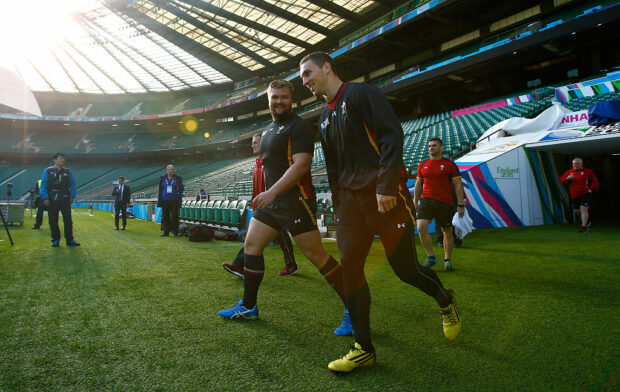
“Since then you set short-term and long-term goals. There are always doubts at the back of your mind. Will I get back to where I was before it happened?
“All I can do is try to get fit and play well enough to get my place back in the Exeter team. We’re very excited at being where we want to be, in the top two of the Premiership and a home quarter-final in Europe.
“Everyone at the club would be gutted if there’s no more rugby before next season. But, having said that, the health of the nation is rather more important than sport.”
While the front row frailty was being exposed in his absence at Twickenham, Francis was otherwise engaged, on club business doing his corporate duty before and after Exeter’s eight-try thrashing of Bath.
“I recorded the match and saw it at home without knowing the score,” he says. “It was a tough watch but the heart the boys showed was great. There was a time, especially after Justin (Tipuric) scored that terrific try straight after half-time when I thought: ‘Yes, this is it’.”
Sometimes one player’s value to a team isn’t fully appreciated until that team has to manage without him. For Welsh fans, the sooner the ex-champions and Francis are united, the better.

